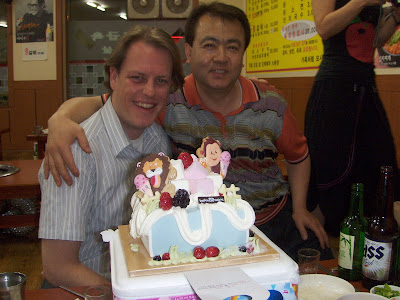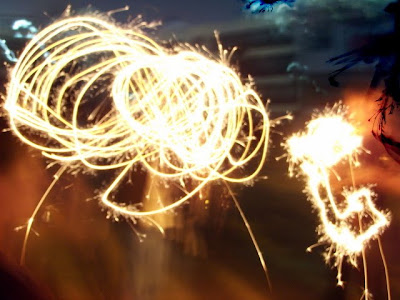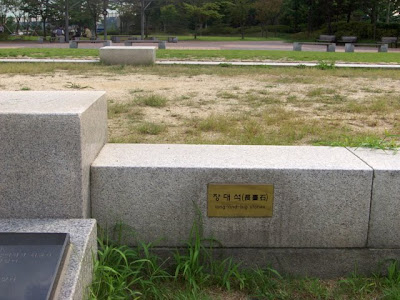Just before September and the start of classes, I return to the Han River near Hapjeong station, a few kilometers west of downtown Seoul. On my way from the subway exit to the jogging path, I come across the remains of an old military site, as well as the oldest "foreigner's missionary cemetery" in Seoul. I wander among the headstones, reading the English inscriptions of missionaries, doctors, and scholars from as far back as the late 18th century, most of which tell of their love for the land and its people. There are more than a few individuals from Vancouver and other Canadian cities buried here. I am humbled by the courage it must have taken to build one's life in such a time and place.





Beyond the graveyard is the Catholic Martyrs Shrine, dedicated to the missionaries who died at the hands of the Korean dynasty of the mid 19th century. Center stage is given to the first ordained Korean catholic priest. For me, these statues speak of both the inspirational power and divisive nature of creeds, religious or otherwise. Sometimes, when I look inward and try to identify my own political commitments, answers begin bumbling around in my head like the 649 lotto. An "identity" is something we are all saddled with, at one point or another, if only because of our friends, but it has never been something I actively sought or even felt comfortable with. Like wearing the designer clothing you got from a well-meaning relative: you have to wear something, and you want to show your gratitude, but making a fashion statement was not at the top of your list of things to do. Granted, a political or religious identity usually has a greater personal and social impact than your choice of what to wear, and will, hopefully, be a more precise statement of the ideals you hope your character will reflect to the world. However, ethical/political/spiritual views seem endlessly fluid these days, at least where I come from, as well as being ceaselessly rebranded with each new generation. This makes my head spin and incites the desire to go live as a hermit somewhere nice, preferably by the sea.
 On a side note, "Jeoldu" is the phonetic translation of the Korean word meaning execution or dismemberment and "san" is the word for mountain, thus "Jeoldusan" = Beheading Mountain. Fortunately for me, I had this all figured out before I even read the inscription. Why you ask? Well, sometimes when I displayed annoyance or disatisfaction to me grade fours, they would exclaim "jeoldu! jeoldu!" to one another followed by a charming throat slitting motion. This was, apparently, hilarious, due to the word's oblique resemblance to my name.
On a side note, "Jeoldu" is the phonetic translation of the Korean word meaning execution or dismemberment and "san" is the word for mountain, thus "Jeoldusan" = Beheading Mountain. Fortunately for me, I had this all figured out before I even read the inscription. Why you ask? Well, sometimes when I displayed annoyance or disatisfaction to me grade fours, they would exclaim "jeoldu! jeoldu!" to one another followed by a charming throat slitting motion. This was, apparently, hilarious, due to the word's oblique resemblance to my name.

 Often enough, when Koreans bring up the topic of their religion, they will say they they are either "Catholic" or "Christian", as if you are not allowed to be both at the same time.
Often enough, when Koreans bring up the topic of their religion, they will say they they are either "Catholic" or "Christian", as if you are not allowed to be both at the same time.
 The oldest Catholic cathedral, in Myeondong, downtown Seoul. I stopped for a look later that week, while waiting to meet my Korean language tutor.
The oldest Catholic cathedral, in Myeondong, downtown Seoul. I stopped for a look later that week, while waiting to meet my Korean language tutor.
The pictures below were taken on my way along the Han river, looking across to the south side of the city.

 The shimery gold building is "63 building" (I'll let my readers guess why), which boast one of the highest man-made vantage points in Seoul, second only to Seoul Tower. I have yet to ride the "Sky-Art" elevator, and visit the aquarium and/or wax-museum at the base.
The shimery gold building is "63 building" (I'll let my readers guess why), which boast one of the highest man-made vantage points in Seoul, second only to Seoul Tower. I have yet to ride the "Sky-Art" elevator, and visit the aquarium and/or wax-museum at the base.



At the end of the first week of September, I and seven others throw a farewell dinner for Ty, just before he leaves Seoul for his hometown of Riverside, California. Our favorite galbi restaurant managers, Mr. Kim and his wife, as well as the local bar manager, are personally devastated to see him go: a testament to Ty's unstinting loyalty and friendship despite the insomnia-inducing split-shifts he worked at BCM's headquarters. Jared and I knew Ty as a galbi-gobbler, consummate food-blogger, music lover, and shameless photo-mugger. His cathartic obscenities, measured appraisals, and self-deprecating charm will be missed in the weeks and months ahead. So will his hair.






The following week, there are three new arrivals at Hwarang. Two are Canadians: Meagan, a 22 year old from Halifax, and Lindsay, a 29 year old from Nanaimo. Wayne, an American, also arrives after a short stint in Japan. Lindsay moves into the unoccupied and unmaintained apartment next door to me (despite our monthly $50 "maintenance" fee), followed by Meagan a week later, who is housed down the block. I acquaint them with the area, and help them move discarded furniture into their bare apartments. They must await the end of the swine flu quarantine period before starting their jobs. Both develop a healthy suspicion of BCM's business practices, due to the poor quality of their reception. Meagan has to fight for her flight money while Lindsay fumigates the bugs and waits for someone to fill the hole in her apartment. And by hole, I mean something that her cat, Grace, could crawl through.
The next weekend, I attend the wedding ceremony of our teaching coordinator, Lisa, along with most of the English staff from Hwarang. Since there is no seating left in the main hall, we are ushered to the floor below where we are served food at banquet tables and watch the choreographed proceedings televised live on a giant screen. There are scads of high-rises around Seoul just like this one, that rent exclusively to wedding parties, within which there are several ceremonies in progress at any given time. The same afternoon, I make an uncustomary decision to go bar-hopping with the heavy-weights (Alex, Anthony, Jamie, Patrick) and the new teachers. Several bars and many drinks later, I find myself in a place I never asked to be, making a decision that I that I never imagined I would make. Regret, humiliation, and mental self-flagellation are the order of the day. Who can I trust when I don't trust myself?


The following week, I purchase tickets for a trip to Beijing, for myself, Jeff, and Caitlin (both of whom work for an after-school hagwon called I-Bo-Young talking club). Imagine my consternation the next day when the principal informs us that swine flu is the school's primary concern, and that travel is henceforth unwarranted. Lisa is away on her honeymoon and BCM panders to Hwarang, changing their tune and telling me not to go abroad on the October long weekend because it would necessitate 7 days quarantine upon my return, in compliance with government regulations regarding teachers with risk of H1N1. It's made clear that unless I personally find a replacement and compensate them in full, my job could be in jeopardy. After I've jumped through all their hoops, Lisa returns to work (sans quarantine) and tells me that the principle still knows nothing of my plans. In the end, the quarantine restrictions will be relaxed and I'll be informed two days before my departure that the principal has made an exception for me and I am to return to work immediately after the thanksgiving weekend. To top it off, my passport will arrive the day before I leave for the airport.
During that waiting period, Jihyun and I spend a week together, trying to recoup lost time, reconcile desires, and hammer out plans for a future that keeps changing shape before our eyes. I celebrate my second birthday in Seoul with her, Jeff, Jared and the two new Cannucks- Meagan and Lindsay. After gorging on samgyapsal, we launch roman candles and pop-rockets from the roof of my apartment, then move on with our beers to the school yard down the street. The next day, Jihyun and I visit a luxurious, five-story gimgilbang, the pinnacle of Korean public relaxation. There are separate shower rooms for men and women which include baths, jets, and a full-body exfoliation service (The sign reads: "Korean buff"). Hobbit sized doors line the length of the spacious upper floors, each one concealing a themed sauna room: salt, jade, charcoal etc. The coldest room is a walk-in freezer, while hottest is designed to look and feel like the inside of a pottery kiln. The building includes wide-screen TVs, snack bars, gyms, electronic gaming rooms, and business rooms. When it gets late, you lie on a thin mat and take your pick of a hard cushion or wooden block with a groove. There are dozens of Korean families, friends, and couples, as well as the odd foreigner or two, sprawled all over the floor like so many white and orange-clad heat-stroke victims. It's surprisingly quiet for so many people in such a confined area: a room full of Koreans is considerably more subdued then a room full of Americans.








Jihyun and I watch a Korean movie with English subs at a DVDbang the following evening (the title escapes me); it comes highly recommended by her medical ethics professor and is one of the saddest movies I've ever seen. An immature, good-for-nothing, black-sheep-of-the-family guy, fresh out of jail for manslaughter, falls in love with a disabled woman. She, in turn, has been neglected by her brother and his wife, who are keeping her isolated and spending her government allowance on themselves. Despite the main character's aborted rape of her on their second encounter, she does everything she can to attract him. She craves the emotional and physical attention that society denies her, and he is astounded by her loving affection. He lives to please her while they keep their budding, platonic relationship a secret, but after they are discovered, he is accused of an impossible crime, and she is powerless to defend him. The actors were fantastic and the final scene of the movie is among the most wrenching I've ever seen. After the movie Jihyun explains why her ethics teacher recommended it- the physical needs of those with disabilities are not only ignored, but can often go completely unrecognized, as was the case with the female protagonist's sexual desire.
 Construction of this brand new plaza in Gwanghwamun, downtown, was completed in late August. Among other things, it features coloured fountains, an underground museum, and a statue in honour of the famous Korean naval commander who successfully repelled attacks by the Japanese, as well as another statue of King Sejeong, famous for implementing the Hangul script. The fountains symbolize the sea, and the smaller turtle statue in front, his armada. Jihyun attended an evening English hagwon not far from here.
Construction of this brand new plaza in Gwanghwamun, downtown, was completed in late August. Among other things, it features coloured fountains, an underground museum, and a statue in honour of the famous Korean naval commander who successfully repelled attacks by the Japanese, as well as another statue of King Sejeong, famous for implementing the Hangul script. The fountains symbolize the sea, and the smaller turtle statue in front, his armada. Jihyun attended an evening English hagwon not far from here.





No comments:
Post a Comment